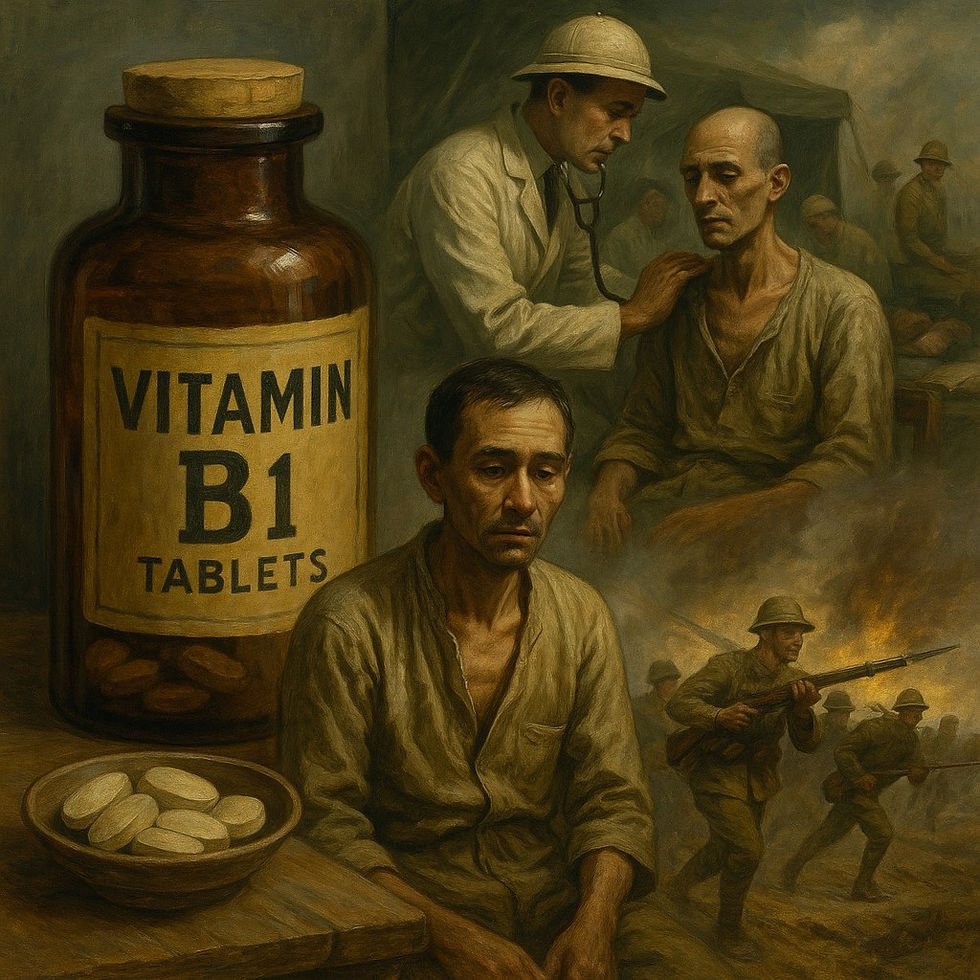Vitamin B1, beriberi, and war
- H.Kitaoka
- Aug 19, 2025
- 3 min read
Updated: Sep 17, 2025

Beriberi was once a widespread disease in East Asia, including Japan, and is known to have had a serious impact on modern Japan's military operations and war efforts. Its cause is now known to be a deficiency of vitamin B1 (thiamine), but at the time it was long considered a "national disease" of unknown cause, and many people lost their lives. The history of beriberi and war is deeply connected to the development of nutrition and medicine.
From the Edo Period to the Meiji Period: White Rice Culture and the Epidemic of Beriberi
In the late Edo period, polished rice became widely used as a staple food in urban areas. White rice was popular because it looked beautiful and had a long shelf life, but removing the germ and bran meant that it lost vitamin B1. As a result, beriberi, known as "Edo disease," became widespread in Edo. Symptoms began with numbness and fatigue in the legs, and as the condition progressed, it could lead to heart failure and even death.
When Japan entered the Meiji era and established a military system as a modern nation, beriberi became a serious problem within the military. Many of the conscripted soldiers came from rural areas and normally ate millet and wheat, so when they entered the military and switched to a diet centered on white rice, many developed beriberi.
Beriberi epidemic during the Sino-Japanese War
During the Sino-Japanese War of 1894, many soldiers in the Japanese Army fell ill with beriberi. It is said that more people died from illness than from fighting, which had a major impact on the country's ability to wage war. At the time, the Army Surgeon General, Mori Ogai, believed that beriberi was caused by bacteria, and placed more emphasis on hygiene management than on improving diet. However, he did not realize that eating white rice was actually the main cause, which resulted in many casualties.
Meanwhile, in the Navy, Dr. Kanehiro Takagi had been focusing on the importance of diet from an early stage. He gave soldiers a diet that included barley rice, bread, and meat instead of white rice, and he was able to dramatically reduce beriberi. Although this was a clear success, there were differences in medical philosophies between the Army and the Navy, and it was not easily accepted by the Army.
The Russo-Japanese War and Overcoming the Beriberi Problem
During the Russo-Japanese War that began in 1904, the army initially suffered from beriberi. However, as the war dragged on, measures such as introducing meals containing barley were implemented, and the damage was reduced compared to the Sino-Japanese War. It was around this time that the causal relationship between diet and beriberi gradually became recognized.
Subsequently, from the 1910s to the 1920s, nutritional science developed worldwide, and it was discovered that a compound extracted from rice bran had anti-beriberi properties. This nutrient was later named "vitamin B1." Vitamin research progressed dramatically in the 1930s, and the true nature of beriberi was finally scientifically elucidated.
War and the development of nutrition
The discovery of vitamin B1 was not merely a medical achievement, but was directly linked to military and national governance. In modern warfare, maintaining the health of soldiers was essential to maintaining fighting power, and combating beriberi was a matter of life and death for the Japanese military.
During World War II, advances in nutritional science were reflected in military meals. Wheat, millet, and dried vegetables were incorporated into soldiers' portable meals and military rations, and beriberi no longer caused large-scale epidemics. Wartime nutritional research also laid the foundation for the postwar school lunch system and nutritionist system.
What I learned from beriberi
The history of beriberi and vitamin B1 offers some lessons.
The relationship between food culture and healthThe cultural preference for white rice has unexpectedly given rise to a national illness. The relationship between diet and health is inextricably linked.
Emphasis on scientific evidenceJust as the Army's insistence on the bacterial theory exacerbated the damage, it is important to place emphasis on objective data rather than being bound by hypotheses.
The Interaction of War and MedicineWhile war has brought tragedies, the health problems of soldiers have also led to the development of nutrition and public health.
in conclusion
Vitamin B1, beriberi, and the history of war were major challenges Japan faced in the process of modernization. White rice, a symbol of its food culture, weakened the military and could have influenced the outcome of the war. However, this bitter experience spurred the development of nutritional science, which later led to improved health and dietary habits for the nation's citizens.
Although beriberi is rarely seen today, looking back at history reminds us of the importance of nutrition and health, which is also very helpful when dealing with modern lifestyle-related diseases and new nutritional challenges.



Comments